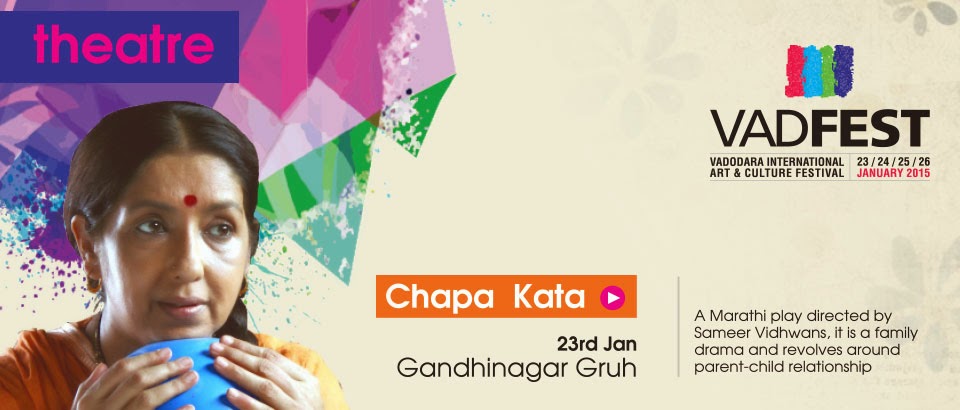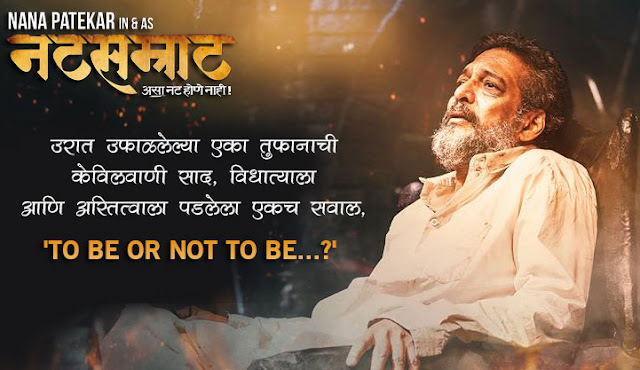Life’s Choices – Chapa Kata (छापा काटा)
Acclaimed Marathi play
staged as part of The Vadodara International Art & Culture Festival - VADFEST
2015[1]
(23rd-26th January, 2015 @ Vadodara, Gujarat) poignantly
narrated the story of a turbulent yet heart-warming mother-daughter
relationship.
What happens when parents are driven by fear about their
children developing their own wings to fly, dreaming of an independent life,
even as the prospect of leaving ‘old parents’ stares them in the face? Can
parents always define what is in the best interest of their child or do they at
times turn selfish? At almost all points in life, we encounter dilemmas,
choices that we may not like to make, but are forced to. Chapa Kata, which in Marathi means ‘heads or tails’ – two sides of
a coin represents the difficult choice faced by a mother and a daughter, when
the daughter tries to carve her own existence and meaning for life.
Staged as part of The Vadodara International Art &
Culture Festival (VADFEST), a four day art and culture extravaganza supported
by The Government of Gujarat and Gujarat Tourism, Chapa Kata resonated with a largely Maharashtrian audience in
Vadodara. It unfolds the life of Uttara (Nina Kulkarni), an aged, widowed and
lonely mother whose only support is her daughter Maitreyi (Mukta Barve). Uttara
is a typical, middle-class, concerned mother who behaves weirdly at times. She
is ever suspicious and intrusive into her daughter’s life. Lonely and scared,
Uttara is also genuinely concerned for Maitreyi’s life – though for a purpose
that serves her own interests.
Uttara’s world stands shaken when she learns that Maitreyi
has fallen in love with a man named Aseem (Ashish Kulkarni), a school teacher.
He has come to Nashik to carry out his Ph.D work, during which he falls head
over heels in love with Maitreyi. As soon as Uttara learns about this, she
begins questioning Maitreyi’s intentions to desert her in old age and settle in
a new city. The hurt she experiences at the prospect of Maitreyi getting
married brings out the ‘selfish woman’ in her. She turns defiant, discourages
Maitreyi from marrying and instils fear of probable unsuccessful relationship.
Maitreyi who has already had bitter experiences in the past, then decides to
part ways with Aseem.
What follows thereafter in the play is an exploration of the
troubled relationship between the two. Interesting conversations are seen
playing out between the mother-daughter as each tries to convince the ‘other’
about why ‘her’ decision is the best. What comes to fore is how ‘selfish’ human
beings become, and how they may be left with no choice at all but to turn
self-centered. While Maitreyi tries convincing her mother to join her in
another city post-marriage, Uttara refuses to bend. Matreyi’s frustrations as a
grown up woman wanting to pursue her dreams, unable to curb her desires is
evident and understandable. The play weaves with its narrative several emotions
such as parent’s expectations, ambition, desire, guilt, emotional pressures,
sacrifice, bonding, identity and morality. It raises questions whose answers
present difficult choices. Do parents err in expecting their children to be by
their side during the fag end of life? Is it alright for children to crush
their dreams and clip their wings for the sake of parents? Life and
relationships are not easy. They bring dilemmas and choices, often all of them
‘correct’ and all of them ‘wrong’ at the same time. How does one choose and how
choices are made is what Chapa Kata
tells us.
 |
| VADFEST - VADODARA 2015 |
Chapa Kata is a
bold attempt in many ways. Usually Indian society attaches moral dimensions to
the parent-child relationship and popular culture tends to portray it in a
dominantly positive way. This is a pious, sacred relationship which can never
go wrong, which can never be questioned. The play goes against the
stereotypical norm and portrays how contemporary relationships face troubled
waters, even if it is between a mother and daughter, usually believed to be the
best of friends. These are tough choices that the family structure faces today.
Especially with single-child families and cases where there is a single parent,
a conflict between ‘desire’ and ‘responsibility’ has emerged. The current
societal umbrella dominated by nuclear families is undergoing constant struggle
over whether to lead a life as desired or to lead one dictated by societal
norms. As tensions evolve between Uttara and Maitreyi, the viewer feels both
are right in their own way. It is difficult for the mother to lead the rest of
her life happily without the daughter, but then it is also difficult for the
daughter to abandon a life that awaits her.
Directed by Sameer Vidwans and written by Iravati Karnik, Chapa Kata firmly puts forth the
question of rights and freedom. Is it not Uttara’s right to be cared for in the
old age? Why should Maitreyi sacrifice her freedom to live in order to fulfil a
responsibility that she may not be willing to take? The answer is actually
none. By the time the play reaches to its climax, the viewer’s sympathies are
not divided. They remain, rather, with both choicwthe mother and the daughter. The
end though is a bit abrupt and predictable, deviating from a radical position
that informs the play’s initial premise.
With every choice that comes in life, there are some that
favour us, there are others that we have to accept. Only circumstances and time
can soothe our decisions, our choices. Some may prove to be the best decisions
of life, some may leave us with guilt and regret. As Maitreyi reaffirms towards
the end, once she comes to terms with her desires and her mother’s
expectations, “Life is all about becoming
unknown to oneself, rediscovering oneself, with all the choices that one has.”
Each choice, whether it is ‘छापा’ or ‘काटा’ make life what it is ideally meant to be –
a journey of twists and turns where one must expect the unexpected.



Comments
Post a Comment